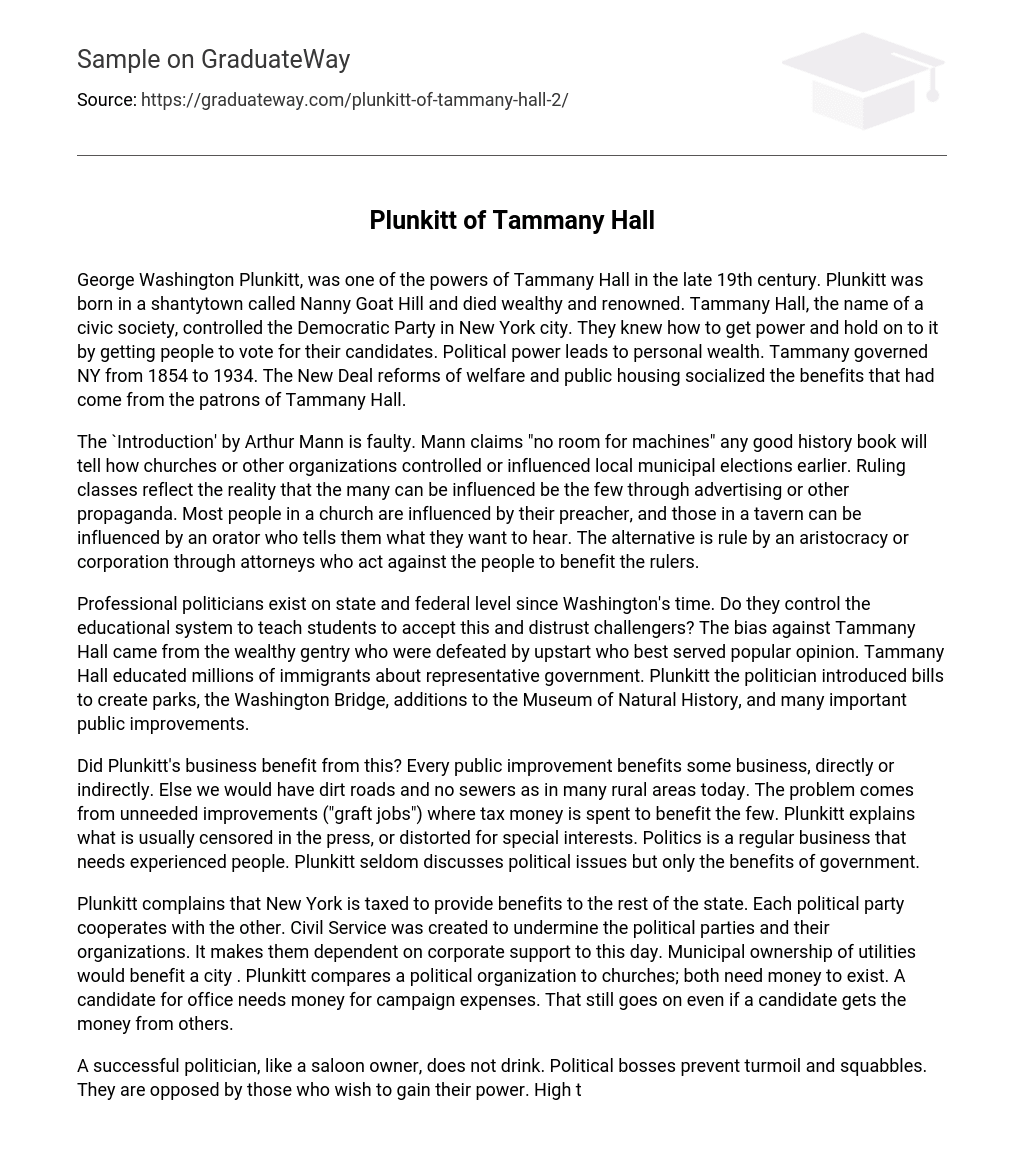George Washington Plunkitt, was one of the powers of Tammany Hall in the late 19th century. Plunkitt was born in a shantytown called Nanny Goat Hill and died wealthy and renowned. Tammany Hall, the name of a civic society, controlled the Democratic Party in New York city. They knew how to get power and hold on to it by getting people to vote for their candidates. Political power leads to personal wealth. Tammany governed NY from 1854 to 1934. The New Deal reforms of welfare and public housing socialized the benefits that had come from the patrons of Tammany Hall.
The `Introduction’ by Arthur Mann is faulty. Mann claims “no room for machines” any good history book will tell how churches or other organizations controlled or influenced local municipal elections earlier. Ruling classes reflect the reality that the many can be influenced be the few through advertising or other propaganda. Most people in a church are influenced by their preacher, and those in a tavern can be influenced by an orator who tells them what they want to hear. The alternative is rule by an aristocracy or corporation through attorneys who act against the people to benefit the rulers.
Professional politicians exist on state and federal level since Washington’s time. Do they control the educational system to teach students to accept this and distrust challengers? The bias against Tammany Hall came from the wealthy gentry who were defeated by upstart who best served popular opinion. Tammany Hall educated millions of immigrants about representative government. Plunkitt the politician introduced bills to create parks, the Washington Bridge, additions to the Museum of Natural History, and many important public improvements.
Did Plunkitt’s business benefit from this? Every public improvement benefits some business, directly or indirectly. Else we would have dirt roads and no sewers as in many rural areas today. The problem comes from unneeded improvements (“graft jobs”) where tax money is spent to benefit the few. Plunkitt explains what is usually censored in the press, or distorted for special interests. Politics is a regular business that needs experienced people. Plunkitt seldom discusses political issues but only the benefits of government.
Plunkitt complains that New York is taxed to provide benefits to the rest of the state. Each political party cooperates with the other. Civil Service was created to undermine the political parties and their organizations. It makes them dependent on corporate support to this day. Municipal ownership of utilities would benefit a city . Plunkitt compares a political organization to churches; both need money to exist. A candidate for office needs money for campaign expenses. That still goes on even if a candidate gets the money from others.
A successful politician, like a saloon owner, does not drink. Political bosses prevent turmoil and squabbles. They are opposed by those who wish to gain their power. High taxes on saloon keepers creates lower-cost competition from “bucket-shops” that sell bootleg whiskey. Prohibition, which was supposed to reduce crime and increase prosperity, did just the reverse. This brief classic of street wise politics was published in 1905 after first appearing as a series of newspaper stories. George Washington Plunkitt was a sort of middle manager of one of the greatest political machines in U. S. history, Tammany Hall, which held power in New York City for much of the period between the Civil War and the 1930s. Most of its men died rich; a few spent their last years in jail. Plunkitt was one of the smarter and luckier ones. And he’s remembered today by historians because he was the only one who talked, openly and on the record, to a reporter from the “New York Evening Post” named Riordan, about how to get and keep power. Riordan published Plunkitt’s musings from his “office”





